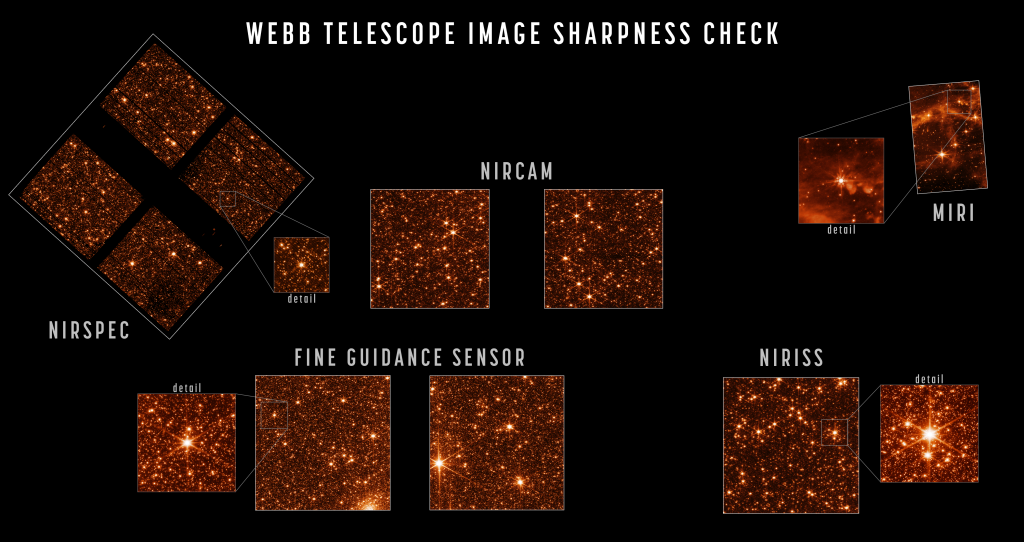Welcome to DU!
The truly grassroots left-of-center political community where regular people, not algorithms, drive the discussions and set the standards.
Join the community:
Create a free account
Support DU (and get rid of ads!):
Become a Star Member
Latest Breaking News
Editorials & Other Articles
General Discussion
The DU Lounge
All Forums
Issue Forums
Culture Forums
Alliance Forums
Region Forums
Support Forums
Help & Search
Science
Related: About this forumNASA's Webb In Full Focus, Ready for Instrument Commissioning
April 28, 2022
Alignment of NASA’s James Webb Space Telescope is now complete. After full review, the observatory has been confirmed to be capable of capturing crisp, well-focused images with each of its four powerful onboard science instruments. Upon completing the seventh and final stage of telescope alignment, the team held a set of key decision meetings and unanimously agreed that Webb is ready to move forward into its next and final series of preparations, known as science instrument commissioning. This process will take about two months before scientific operations begin in the summer.
The alignment of the telescope across all of Webb’s instruments can be seen in a series of images that captures the observatory’s full field of view.
“These remarkable test images from a successfully aligned telescope demonstrate what people across countries and continents can achieve when there is a bold scientific vision to explore the universe,” said Lee Feinberg, Webb optical telescope element manager at NASA’s Goddard Space Flight Center.
The optical performance of the telescope continues to be better than the engineering team’s most optimistic predictions. Webb’s mirrors are now directing fully focused light collected from space down into each instrument, and each instrument is successfully capturing images with the light being delivered to them. The image quality delivered to all instruments is “diffraction-limited,” meaning that the fineness of detail that can be seen is as good as physically possible given the size of the telescope. From this point forward the only changes to the mirrors will be very small, periodic adjustments to the primary mirror segments.
“With the completion of telescope alignment and half a lifetime’s worth of effort, my role on the James Webb Space Telescope mission has come to an end,” said Scott Acton, Webb wavefront sensing and controls scientist, Ball Aerospace. “These images have profoundly changed the way I see the universe. We are surrounded by a symphony of creation; there are galaxies everywhere! It is my hope that everyone in the world can see them.”

High Resolution image
Engineering images of sharply focused stars in the field of view of each instrument demonstrate that the telescope is fully aligned and in focus. For this test, Webb pointed at part of the Large Magellanic Cloud, a small satellite galaxy of the Milky Way, providing a dense field of hundreds of thousands of stars across all the observatory’s sensors. The sizes and positions of the images shown here depict the relative arrangement of each of Webb’s instruments in the telescope’s focal plane, each pointing at a slightly offset part of the sky relative to one another. Webb’s three imaging instruments are NIRCam (images shown here at a wavelength of 2 microns), NIRISS (image shown here at 1.5 microns), and MIRI (shown at 7.7 microns, a longer wavelength revealing emission from interstellar clouds as well as starlight). NIRSpec is a spectrograph rather than imager but can take images, such as the 1.1 micron image shown here, for calibrations and target acquisition. The dark regions visible in parts of the NIRSpec data are due to structures of its microshutter array, which has several hundred thousand controllable shutters that can be opened or shut to select which light is sent into the spectrograph. Lastly, Webb’s Fine Guidance Sensor tracks guide stars to point the observatory accurately and precisely; its two sensors are not generally used for scientific imaging but can take calibration images such as those shown here. This image data is used not just to assess image sharpness but also to precisely measure and calibrate subtle image distortions and alignments between sensors as part of Webb’s overall instrument calibration process. Credit: NASA/STScI
...
https://blogs.nasa.gov/webb/2022/04/28/nasas-webb-in-full-focus-ready-for-instrument-commissioning/
Alignment of NASA’s James Webb Space Telescope is now complete. After full review, the observatory has been confirmed to be capable of capturing crisp, well-focused images with each of its four powerful onboard science instruments. Upon completing the seventh and final stage of telescope alignment, the team held a set of key decision meetings and unanimously agreed that Webb is ready to move forward into its next and final series of preparations, known as science instrument commissioning. This process will take about two months before scientific operations begin in the summer.
The alignment of the telescope across all of Webb’s instruments can be seen in a series of images that captures the observatory’s full field of view.
“These remarkable test images from a successfully aligned telescope demonstrate what people across countries and continents can achieve when there is a bold scientific vision to explore the universe,” said Lee Feinberg, Webb optical telescope element manager at NASA’s Goddard Space Flight Center.
The optical performance of the telescope continues to be better than the engineering team’s most optimistic predictions. Webb’s mirrors are now directing fully focused light collected from space down into each instrument, and each instrument is successfully capturing images with the light being delivered to them. The image quality delivered to all instruments is “diffraction-limited,” meaning that the fineness of detail that can be seen is as good as physically possible given the size of the telescope. From this point forward the only changes to the mirrors will be very small, periodic adjustments to the primary mirror segments.
“With the completion of telescope alignment and half a lifetime’s worth of effort, my role on the James Webb Space Telescope mission has come to an end,” said Scott Acton, Webb wavefront sensing and controls scientist, Ball Aerospace. “These images have profoundly changed the way I see the universe. We are surrounded by a symphony of creation; there are galaxies everywhere! It is my hope that everyone in the world can see them.”

High Resolution image
Engineering images of sharply focused stars in the field of view of each instrument demonstrate that the telescope is fully aligned and in focus. For this test, Webb pointed at part of the Large Magellanic Cloud, a small satellite galaxy of the Milky Way, providing a dense field of hundreds of thousands of stars across all the observatory’s sensors. The sizes and positions of the images shown here depict the relative arrangement of each of Webb’s instruments in the telescope’s focal plane, each pointing at a slightly offset part of the sky relative to one another. Webb’s three imaging instruments are NIRCam (images shown here at a wavelength of 2 microns), NIRISS (image shown here at 1.5 microns), and MIRI (shown at 7.7 microns, a longer wavelength revealing emission from interstellar clouds as well as starlight). NIRSpec is a spectrograph rather than imager but can take images, such as the 1.1 micron image shown here, for calibrations and target acquisition. The dark regions visible in parts of the NIRSpec data are due to structures of its microshutter array, which has several hundred thousand controllable shutters that can be opened or shut to select which light is sent into the spectrograph. Lastly, Webb’s Fine Guidance Sensor tracks guide stars to point the observatory accurately and precisely; its two sensors are not generally used for scientific imaging but can take calibration images such as those shown here. This image data is used not just to assess image sharpness but also to precisely measure and calibrate subtle image distortions and alignments between sensors as part of Webb’s overall instrument calibration process. Credit: NASA/STScI
...
https://blogs.nasa.gov/webb/2022/04/28/nasas-webb-in-full-focus-ready-for-instrument-commissioning/
So far, so good. Actually it's exceeding expectations.
InfoView thread info, including edit history
TrashPut this thread in your Trash Can (My DU » Trash Can)
BookmarkAdd this thread to your Bookmarks (My DU » Bookmarks)
3 replies, 991 views
ShareGet links to this post and/or share on social media
AlertAlert this post for a rule violation
PowersThere are no powers you can use on this post
EditCannot edit other people's posts
ReplyReply to this post
EditCannot edit other people's posts
Rec (16)
ReplyReply to this post
3 replies
 = new reply since forum marked as read
Highlight:
NoneDon't highlight anything
5 newestHighlight 5 most recent replies
= new reply since forum marked as read
Highlight:
NoneDon't highlight anything
5 newestHighlight 5 most recent replies
NASA's Webb In Full Focus, Ready for Instrument Commissioning (Original Post)
Make7
Apr 2022
OP
Baked Potato
(7,733 posts)1. Something to look forward to... the look back in time will be WOW...
Cheezoholic
(2,613 posts)2. Absolutely, BUTT when it glimpses the beginning of time
if this is what we see, we're screwed
(![]() < he made me do it)
< he made me do it)
lastlib
(24,902 posts)3. YOMANK!* Oh, GAWD, you just made me retch!
(Why does that double-chin remind me of testicles?? - - -
*"You Owe Me A New Keyboard!"
